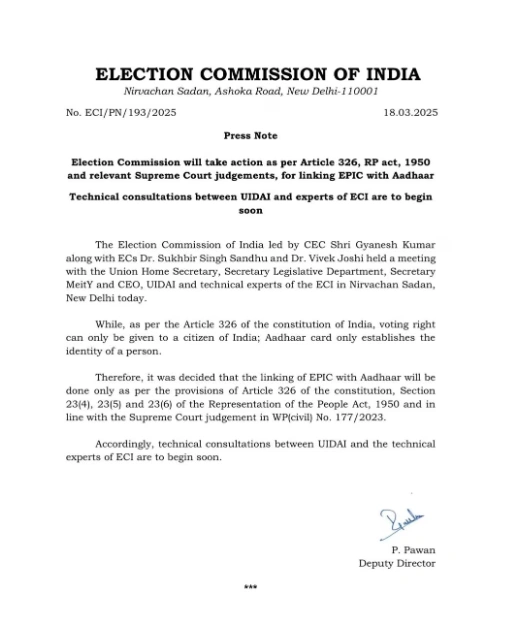The Election Commission of India (ECI) has initiated the linking of Voter ID cards with Aadhaar numbers. This initiative aims to eliminate duplicate and fraudulent entries in the electoral roll, ensuring a more accurate and credible voter database.

Background
The concept of linking Aadhaar with Voter ID cards was first introduced in 2015 under the National Electoral Roll Purification and Authentication Programme (NERPAP). The primary objective was to authenticate voter identities and remove duplicate entries in the electoral roll. However, the program was paused following a Supreme Court order limiting the use of Aadhaar to specific government schemes.
In 2021, the government passed the Election Laws (Amendment) Bill, facilitating the voluntary linking of Aadhaar with Voter ID cards. The Election Commission of India (ECI) resumed the collection of Aadhaar numbers in July 2022, introducing Form 6B for existing electors to provide their Aadhaar details.

Recent Developments
In March 2025, Chief Election Commissioner (CEC) Gyanesh Kumar emphasized the importance of linking Aadhaar with electoral rolls to ensure proper identification of electors and effective communication. He stated:
In order to ensure proper identification of electors and ensure necessary communication, all attempts should be made to link with Aadhaar and mobile numbers.
 Implementation Strategy
Implementation Strategy
The ECI has outlined a comprehensive strategy to implement this initiative:
- Consultations with Stakeholders: The ECI plans to hold meetings with technical experts from the Unique Identification Authority of India (UIDAI) and other relevant authorities to discuss the modes of linking Aadhaar with Voter ID cards. These consultations aim to ensure that the process aligns with constitutional and legal provisions.
- Field-Level Verification: Booth Level Officers (BLOs) will conduct door-to-door surveys to collect Aadhaar numbers from electors. During these visits, BLOs will verify the authenticity of voter details, ensuring that the information in the electoral roll is accurate and up-to-date.
- Public Awareness: To educate voters about the benefits and procedures of linking their Aadhaar with Voter ID cards, the ECI will launch awareness campaigns. This will address concerns regarding privacy and data security.
Legal and Privacy Considerations
The ECI has proposed amendments to the Representation of the People Act, 1950, to remove the requirement for voters to provide a "sufficient cause" for not furnishing their Aadhaar numbers. The ECI has assured that Aadhaar will serve solely as an identity verification tool and will not confer citizenship rights. Additionally, the ECI emphasizes that data collected will be protected under privacy laws, and measures will be implemented to prevent unauthorized access.
Some parties view the initiative as a necessary step to enhance electoral integrity. Others express concerns about the potential lack of voting rights, particularly among marginalized communities who may lack Aadhaar cards. They urge the ECI to ensure that the process does not exclude eligible voters.

A healthy democracy, in my opinion, depends critically on maintaining the integrity of our election system. By addressing problems like duplicate registrations and out-of-date voter data, the effort to connect voter ID cards with Aadhaar could result in more legitimate elections. But this procedure needs to be carried out carefully. To secure the private information of citizens, strong data protection procedures must be put in place. Furthermore, the ECI must communicate clearly that this exercise is optional to avoid voter confusion and unwarranted fear.
#VoterID #Aadhaar #Elections2023 #ElectoralReform #IndiaVotes

















No comments yet.